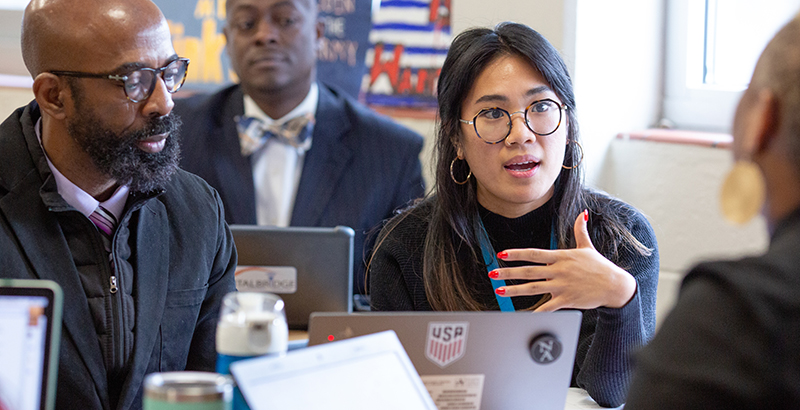Shelton: Black and Brown School Leaders are Essential for Real Educational Equity, But They Need Support in Order to Succeed

Get stories like this delivered straight to your inbox. Sign up for The 74 Newsletter
Authentic connections among educators, students, parents and their community are critical for the success of a school. These connections are essential in pursuing equity, addressing opportunity gaps and supporting Black and brown students.
Unfortunately, between the underrepresentation of Black teachers and school leaders and the utter failure of teacher training programs to adequately prepare educators to adequately prepare all teachers to effectively serve Black and brown students, that authentic connection is in precariously short supply.
African Americans account for just 7 percent of the teaching population and 11 percent of school leaders, while 15 percent of students are Black. And while nearly 30 percent of public school students identify as Hispanic, just 8 percent of teachers and 9 percent of principals do. These aren’t just harrowing mismatches; they’re self-reinforcing deficiencies that push children further behind.
Research has shown the profoundly positive impact that Black and brown teachers and leaders have on students, but it also has demonstrated the effect they can have on the larger school community. Black- and brown-led schools are more effective recruiters of Black and brown teachers. Black, brown and Indigenous school founders and leaders more easily build trusting relationships with the communities in which their schools are located.
With a push to acknowledge these too often ignored facts, there has been a welcome swell in the number of voices calling for more Black and brown leaders to be put in top roles. But a truly effective effort will take more than just replacing white faces with Black or brown ones. These leaders need the resources to create institutions and systems of their own design and vision, and there has to be a broader vision of what it means to lift up leaders of color. For that to happen, our public schools and the organizations that contribute to their effective operation need to construct systems of support and preparation that liberate Black and brown educators to thrive.
Unfortunately, a disproportionate number of Black- and brown-led schools, especially in the public charter school sector, face barriers to funds, inadequate leadership support, and even outright closures. That’s why the organization I lead, the National Charter Collaborative, is exclusively focused on supporting the work of charter school leaders of color through what we call an umbrella of support.
It starts with supply. We work to increase the number of school leaders and grow the pipeline of school board members of color. These leaders, properly supported, can do profound good by their students and communities. As Yetta Lewis of Gestalt Community Schools has said, “When you know a child and form an authentic relationship with their parents, it impacts how you educate a child, it impacts how they access the educational environment.”
Second, we strengthen. We build professional learning communities and provide real thought partnership through our flagship Manati Fellowship — an 18-month program for Black and brown school leaders centered on developing innovative, scalable and culturally responsive solutions with their peers and subject matter experts. Our goal is to ensure that Black- and brown-led schools can not only succeed, but thrive and expand to serve more students and communities of color. I myself have seen the power of a peer network. Having participated in the City Fellowship supported by City Fund, the relationships, perspective and support I have received from my fellow education leaders have strengthened my practice and expanded my toolkit as a leader.
Finally, we work to sustain Black- and brown-led schools. This takes the form of research on the issues and challenges facing school leaders of color, their students and their communities. This empowers school leaders to improve the teaching and learning in their schools, build their own leadership practices and provide the comprehensive support their communities require.
Our work to sustain also takes the form of ensuring that the voices of Black and brown school leaders and their school communities are heard and valued. Being able to tell our own story as school leaders, to directly speak your own truth to power, has always been vital for our shared liberation — education or otherwise. The collaborative provides the tools, strategies, networks and capacity to effectively share the challenges and successes our schools and leaders face and, in doing so, help them make the case for their continued growth.
Schools leaders of color are essential levers in the pursuit of educational equity and justice. But in order for them to thrive, we must overcome the barriers to their historical success. That requires a network of supports designed specifically to enable Black and brown leaders and teachers to do their best work in the service of their students and communities. The National Charter Collaborative’s mission is to foster such a network of support — a vital and urgent aim.
Naomi N. Shelton is chief executive officer of the National Charter Collaborative, a nonprofit organization focused on increasing the diversity and performance of the nation’s charter school sector by supporting the success of single-site schools led by leaders of color.
Disclosure: The City Fund provides financial support to The 74.
Get stories like these delivered straight to your inbox. Sign up for The 74 Newsletter

;)